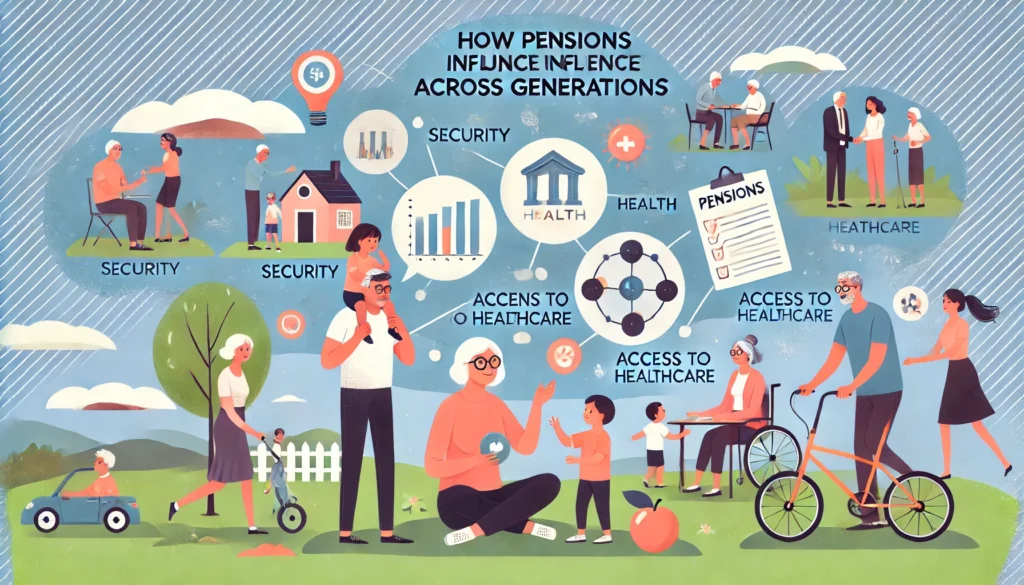
Introduction
Pensions play a crucial role in providing financial security for retirees, but their impact extends far beyond mere financial stability. The influence of pensions on health across generations is a multifaceted issue that encompasses economic, social, and psychological dimensions. This comprehensive analysis delves into how pensions affect health outcomes, not only for the individuals receiving them but also for their families and future generations.
Understanding Pensions and Their Importance
What are Pensions?
Pensions are retirement plans that provide a steady income to individuals after they retire from active work. These plans are typically funded by contributions from employers, employees, or both, and are designed to offer financial support during retirement.
Types of Pensions
Defined Benefit Plans
Defined benefit plans promise a specified monthly benefit upon retirement, calculated based on factors such as salary history and years of service. These plans offer predictable income, contributing to financial stability in retirement.
Defined Contribution Plans
Defined contribution plans, such as 401(k)s, involve contributions from employers and employees into individual accounts. The retirement benefit depends on the investment performance of these accounts, introducing an element of financial risk and variability.
Importance of Pensions
Pensions are vital for ensuring financial security during retirement, reducing the risk of poverty among the elderly, and providing a safety net that can alleviate stress and improve overall well-being.
Direct Impact of Pensions on Health
Financial Security and Stress Reduction
Alleviating Financial Worries
Financial security provided by pensions helps reduce stress and anxiety related to financial instability. This reduction in stress has a direct positive impact on mental health, lowering the risk of depression and anxiety disorders.
Access to Healthcare
With a stable income from pensions, retirees can afford better healthcare, including regular check-ups, medications, and treatments. This access to healthcare contributes to better management of chronic conditions and overall improved health outcomes.
Improved Nutrition and Lifestyle
Healthy Living
Financial stability allows retirees to invest in healthier food options and maintain an active lifestyle. Good nutrition and regular physical activity are essential for preventing lifestyle-related diseases such as diabetes, hypertension, and obesity.
Social Engagement
Pensions also enable retirees to engage in social activities and hobbies, promoting mental well-being and reducing the risk of isolation and loneliness, which are known risk factors for various health issues.
Intergenerational Influence of Pensions on Health
Financial Support for Families
Supporting Younger Generations
Retirees with pensions are often able to provide financial support to their children and grandchildren, helping them with education, housing, and other expenses. This support can relieve financial burdens on younger family members, reducing their stress levels and promoting better mental health.
Educational Opportunities
Financial stability within a family can lead to increased educational opportunities for younger generations. Higher education levels are associated with better health outcomes, as education often leads to better job prospects, higher income, and access to healthcare.
Role Modeling and Family Dynamics
Positive Health Behaviors
Retirees who maintain good health and financial stability can serve as positive role models for younger family members. Observing healthy behaviors and financial prudence can influence the lifestyle choices of children and grandchildren.
Enhanced Family Cohesion
Financial security provided by pensions can reduce family conflicts related to money, leading to more harmonious family relationships. Strong family bonds and a supportive home environment are critical for the mental and emotional well-being of all family members.
Long-Term Societal Benefits of Pensions
Reducing Public Health Burden
Lower Healthcare Costs
By ensuring that retirees have access to healthcare and can maintain healthy lifestyles, pensions can contribute to lower healthcare costs at the societal level. Healthy retirees are less likely to require expensive medical interventions and long-term care.
Improved Public Health Outcomes
Financially secure retirees contribute to overall improved public health outcomes. With fewer retirees living in poverty, the incidence of poverty-related health issues decreases, leading to a healthier population.
Economic Stability and Growth
Stimulating the Economy
Pensions provide a stable source of income for retirees, which they spend on goods and services, stimulating the economy. This economic activity supports businesses and can lead to job creation, further enhancing community well-being.
Reducing Dependency on Social Welfare
Financially independent retirees are less likely to rely on social welfare programs, reducing the financial burden on the government. This allows for the reallocation of resources to other critical areas, such as education and infrastructure.
FAQs
How do pensions impact mental health?
Pensions reduce financial stress, which has a positive impact on mental health. Financial security can lower the risk of anxiety and depression among retirees.
Can pensions influence the health of non-retirees in a family?
Yes, pensions can provide financial support to younger family members, reducing their stress and enabling better access to education and healthcare, thereby improving their overall health.
What are the differences between defined benefit and defined contribution plans?
Defined benefit plans offer a specified monthly benefit upon retirement, providing predictable income. Defined contribution plans depend on individual account contributions and investment performance, leading to variable retirement benefits.
How do pensions contribute to better nutrition?
Financial stability from pensions allows retirees to afford healthier food options, contributing to better nutrition and overall health.
Do pensions have a societal impact beyond individual families?
Yes, pensions can reduce public healthcare costs, stimulate the economy, and lower dependency on social welfare programs, contributing to broader societal benefits.
How can pensions improve family cohesion?
Financial security reduces money-related conflicts within families, leading to more harmonious relationships and a supportive home environment, which are beneficial for mental and emotional health.
Conclusion
Pensions play a vital role in enhancing health outcomes across generations by providing financial security, reducing stress, and enabling better access to healthcare and nutrition. The benefits of pensions extend beyond individual retirees, positively influencing their families and society at large. Understanding the comprehensive impact of pensions underscores their importance in promoting long-term health and well-being. insuranceallinone